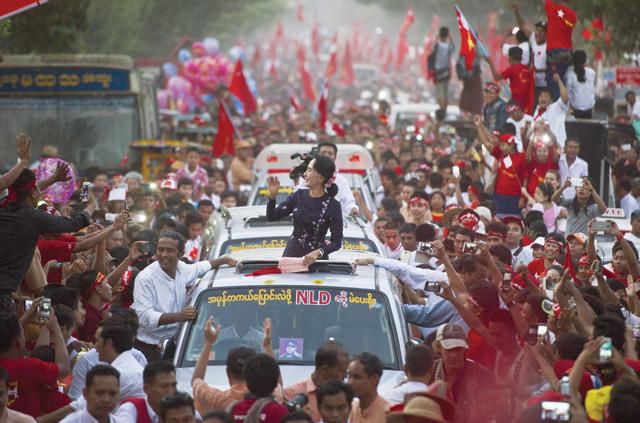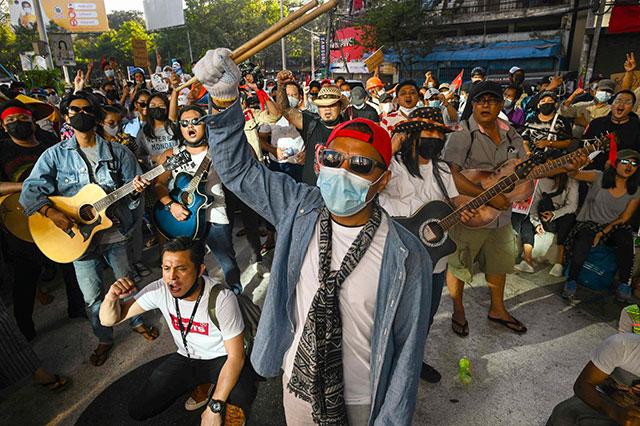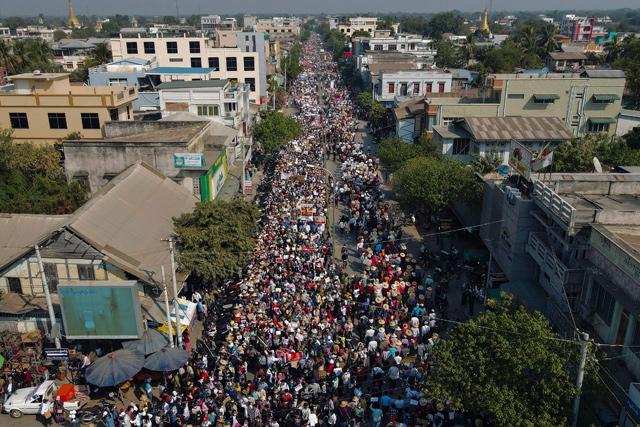You are here
Myanmar's Suu Kyi charged as calls to oppose coup grow
By AFP - Feb 04,2021 - Last updated at Feb 04,2021
YANGON — Myanmar's ousted leader Aung San Suu Kyi was formally charged on Wednesday two days after she was detained in a military coup, as calls for civil disobedience to oppose the putsch gathered pace.
The Southeast Asian nation was plunged back into direct military rule when soldiers arrested key civilian leaders in a series of dawn raids on Monday, ending the army's brief flirtation with democracy.
Su Kyi, who has not been seen in public since, won a huge landslide with her National League for Democracy (NLD) last November but the military — whose favoured parties received a drubbing — declared the polls fraudulent.
On Wednesday, the NLD's press officer said the 75-year-old was formally charged with an offence under Myanmar's import and export law, with a court signing off on two weeks' remand.
The unusual charge stemmed from a search of her house following her arrest in which walkie-talkies were discovered, according to a leaked police charging document seen by reporters.
A similarly unorthodox charge under the country's disaster management law against President Win Myint revolved around him allegedly breaching anti-coronavirus measures last year by meeting voters on the campaign trail.
With soldiers and armoured cars back on the streets of major cities, the takeover has not been met by any large street protests.
But signs of public anger and plans to resist have begun to flicker.
Doctors and medical staff at multiple hospitals across the country announced Wednesday they were donning red ribbons and walking away from all non-emergency work to protest against the coup.
"Our main goal is to accept only the government we elected," Aung San Min, head of a 100-bed hospital in Gangaw district, told AFP.
Some medical teams posted pictures on social media wearing red ribbons — NLD colours — and raising a three-finger salute, a protest gesture used by democracy activists in neighbouring Thailand, while some have chosen to bypass work altogether.
"My protest starts today by not going to the hospital... I have no desire to work under the military dictatorship," said Nor Nor Wint Wah, a doctor in Mandalay.
Activists were announcing their campaigns on a Facebook group called "Civil Disobedience Movement" which by Wednesday afternoon had more than 150,000 followers within 24 hours of its launch.
The clatter of pots and pans — and the honking of car horns — also rang out across the commercial capital Yangon on Wednesday evening for a second night in a row after calls for protest went out on social media.
In some neighbourhoods, residents shouted in the streets and sang democracy protest songs.
Military's deadly legacy
Army chief Min Aung Hlaing appointed himself head of a new cabinet stacked with former and current generals, justifying his coup on Tuesday as the "inevitable" result of civilian leaders' failure to heed the army's fraud warnings.
The military declared a one-year state of emergency and said it would hold new elections once its allegations of voter irregularities were addressed and investigated.
The move stunned Myanmar, a country left impoverished by decades of junta misrule before it began taking steps towards a more democratic and civilian-led government 10 years ago.
But protesting is fraught with risk.
During junta rule, dissent was quashed with thousands of activists — including Suu Kyi — detained for years on end.
Censorship was pervasive and the military frequently deployed lethal force during periods of political turmoil, most notably during huge protests in 1988 and 2007.
The new government has already issued a warning telling people not to say or post anything that might "encourage riots or an unstable situation".
On Wednesday, the NLD announced the military had committed "unlawful acts" in the coup's aftermath, raiding its party offices across the country and seizing documents and computers.
International censure
The army's actions have been met with a growing chorus of international condemnation — although the options are limited for those nations hoping Myanmar's generals might reverse course.
On Tuesday the State Department formally designated the takeover as a coup, meaning the United States cannot assist the Myanmar government.
Any impact will be mainly symbolic, as almost all assistance goes to non-government entities and Myanmar's military was already under US sanctions over its brutal campaign against the Rohingya minority.
UN Secretary General Antonio Guterres and several other nations have also spoken out.
The UN Security Council held an emergency meeting on Tuesday but failed to agree on a statement condemning the coup.
To be adopted, it requires the support of China, which wields veto power as a permanent Security Council member and is Myanmar's main supporter at the UN.
"China and Russia have asked for more time," said a diplomat requesting anonymity.
Both countries repeatedly shielded Myanmar from censure at the UN over the military's crackdown on the Rohingya, a campaign that UN investigators said amounted to genocide.
With the UN meeting failing to issue a statement, G-7 nations produced their own calling on Myanmar's military to reverse course.
Related Articles
YANGON — The party of Myanmar's toppled leader Aung San Suu Kyi demanded her immediate release Tuesday, after a military coup that triggered
YANGOUN — Myanmar's ruling general signalled waning patience on Thursday with nationwide protests over the military's takeover, ordering dem
YANGON — Opposition to Myanmar's new military regime intensified on Saturday as spontaneous neighbourhood watch groups mobilised to thwart a



















